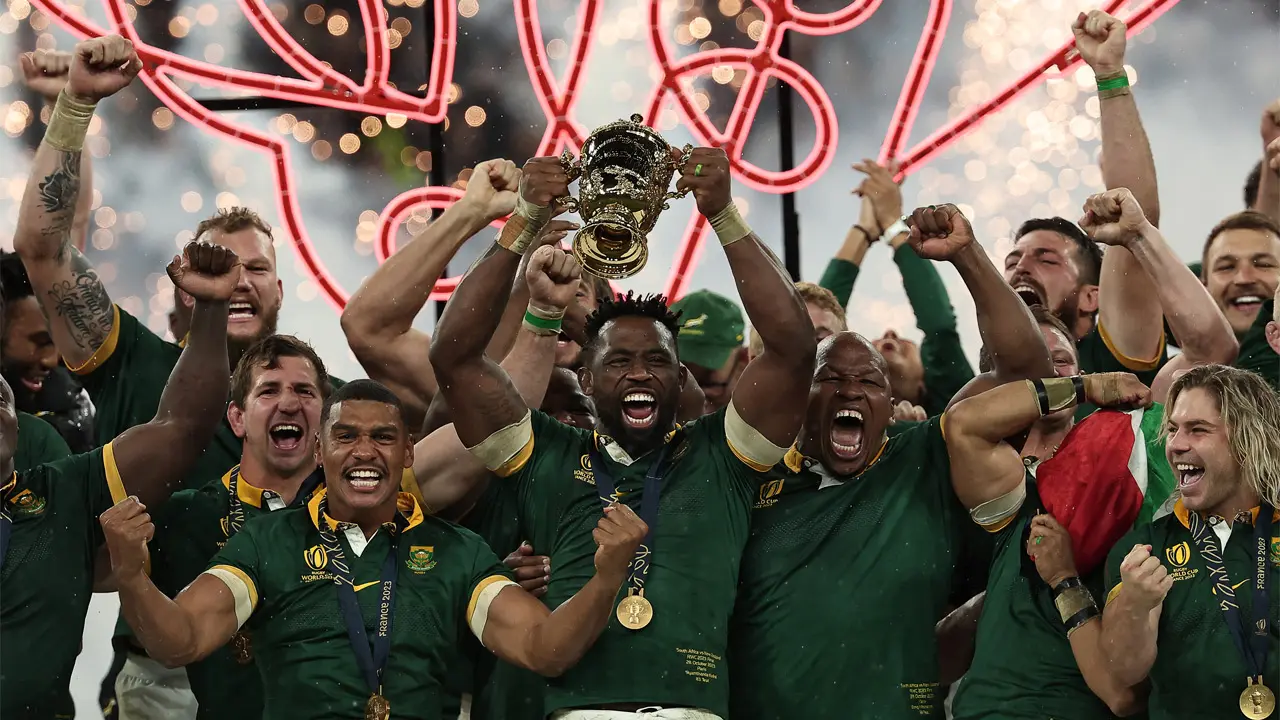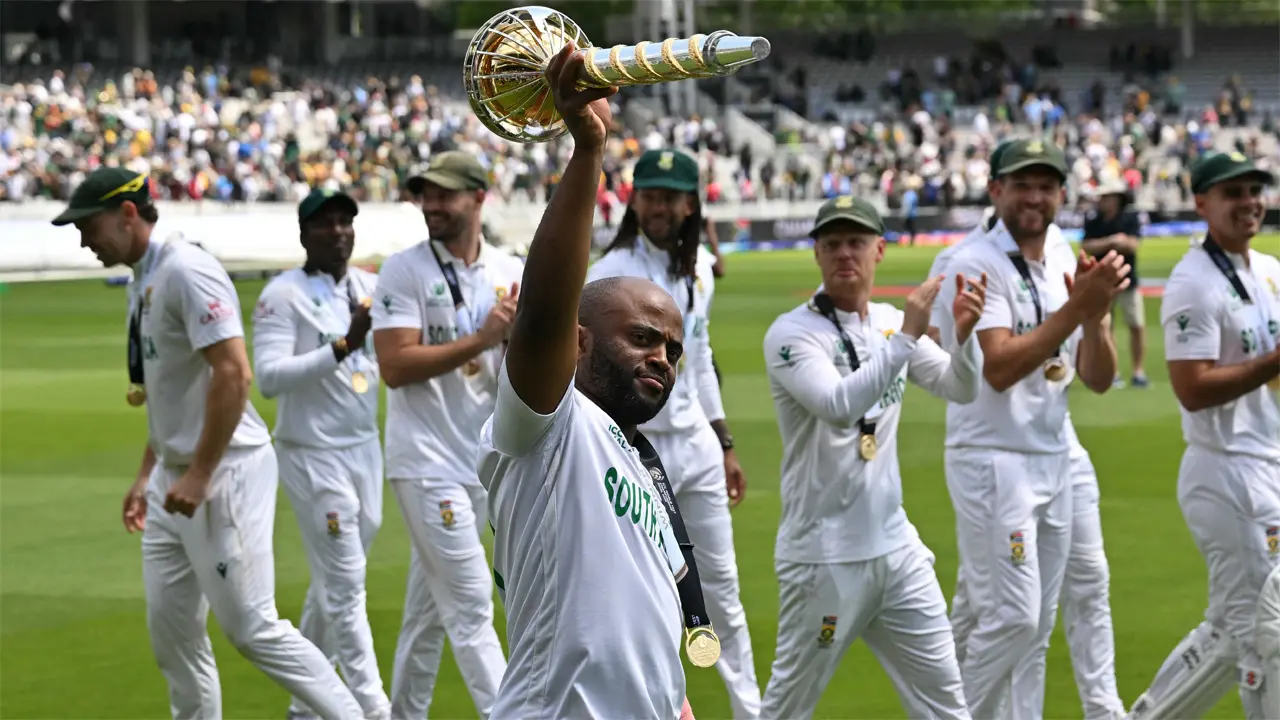The self-belief had a good effect on him. He started to behave differently

South Africa captain Siya Kolisi lifts the trophy after winning the 2023 Rugby World Cup final at the Stade de France in Saint-Denis, Paris, on October 28, 2023. Pic/AFP

If you’re still counting the number of qualities that helped Temba Bavuma rally his troops for a triumph as massive as the ICC World Test Championship, I will give you another — being close to the right people.
I believe he had a lot of discussions with our rugby captain Siya Kolisi, who the sporting world knows as a highly accomplished Springboks skipper. Under Kolisi, South Africa won back-to-back rugby World Cups in 2019 at Japan and 2023 at France. I’ve watched a fair bit of Bavuma and noticed how he came to terms with dealing with the pressures of being a black captain of South Africa. There is a possibility that Kolisi and Bavuma are represented by the same agency, but surely they have shared a lot of information, and somewhere down the line, those chats have proved fruitful. Bavuma has been transformed into an astute leader of men. There was no shortage of criticism for Bavuma, but never underestimate what an individual can do in his own quiet way. He developed the self-belief and passed it on to his team.

South Africa captain Temba Bavuma holds the ICC World Test Championship Mace after winning the World Test Championship final at Lord's, London, on June 14, 2025. Pic/AFP
The self-belief had a good effect on him. He started to behave differently. His interviews were done with a lot more confidence. I was asked the other day how do I view Bavuma since I’ve been the first non-white cricketer to represent South Africa. Well, I’ll tell you what I said in my book, Man in the Middle, after I retired from cricket, in 1994. I said that I’m very confident of the fact that South Africa as a nation historically, even during the apartheid years, had talented sports people. It didn’t matter what ethnic group you represented. They were seriously talented.
When it came to cricket specifically, there was going to be a challenge for the black African batter getting exposed to international cricket — how quickly can we produce them, how good can they become. That was always what I saw in my experience growing up in the apartheid years and then after unification. I was confident that we were going to produce white South African and black South African quick bowlers like the West Indies because our guys are strong and come from a rugby mentality. And then, we produced batsmen. You saw the Indian flair with Hashim Amla, the natural flair of Herschelle Gibbs, JP Duminy, Ashwell Prince, and others. The picture I’ve just sketched tells you that in diversity, there is strength. It was always going to be important how we nurture that deliberately.
Bavuma and his team have given the Rainbow Nation’s sporting fraternity much to celebrate. Head coach Shukri Conrad created an environment wherein there was a lot of unification done. Conrad’s masterstroke was to have a conversation with Rassie Erasmus, South Africa’s rugby coach, at the start of the year during the home series against Pakistan. It was like the cricket set up was absorbing every bit of inspiration they could find to reach their ultimate goal. Critics say the Proteas had an easy route, having beaten teams like West Indies, Bangladesh, Sri Lanka, and Pakistan, to enter the final against the Australians at Lord’s. But you can’t blame South Africa for getting those cards dealt to them by the ICC and let’s not forget they played very well in this cycle of Test matches. The building blocks turned out to be a very strong foundation and the team got stronger.
It was a gripping final. The overhead conditions in England were always going to help the bowlers, but I don’t know whether it was the Dukes ball on that pitch or whether it was the pitch that contributed to the domination of the bowlers. Fourteen wickets fell on Day One itself. Even the best batsmen in the world would not have fancied batting on that pitch. Any ball had your number on it. And then it was a case of when the weather was going to change and who would be lucky enough to bat during that time. We were lucky to get that in the second innings. The partnership of Aiden Markam and Wiaan Mulder was critical. Their stand of 70 gave me the confidence that South Africa just needed two batsmen to get their eye in. Fortunately for us, the two most senior batters in the team got in and took responsibility. South Africa’s overall batting reminded me of previous teams that had Graeme Smith, Jacques Kallis, Amla as front liners and how Gary Kirsten often took responsibility and really showed the way through. Markam was brilliant throughout the cycle and of course through his century in the final.
The WTC victory provided us a platform to contemplate and appreciate. Not long ago, people were up in arms when we sent a second-string Test team to New Zealand while the SA20 tournament was the centre of focus. Those in charge of SA20, Cricket South Africa, the director of cricket, the current coaching staff of the national teams, the players... they realised that we are all in this together and we have to direct our energy in the right direction not only for the sake of cricket in this country, but for cricket globally and for the future of democracy in this country.
There's something for Cricket South Africa to learn from in terms of neglected aspects like the structure of domestic four-day cricket. There are a lot of things that this victory can impact as a whole. It has taken 30 years to showcase what we have. It is now what we are going to do in the next 30 years that will matter. The road ahead is about collaborating and making sure that the cohesion just gets stronger and stronger. The world might have seen glimpses of what South Africa can produce. I don’t think they’ve seen it as a whole yet.
Former spinning all-rounder Omar Henry played for SA from 1992 to 1993 and was their chief selector.
 Subscribe today by clicking the link and stay updated with the latest news!" Click here!
Subscribe today by clicking the link and stay updated with the latest news!" Click here!










